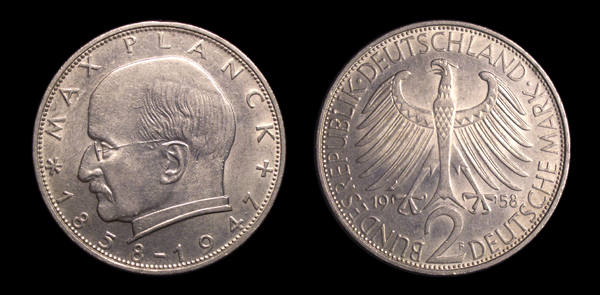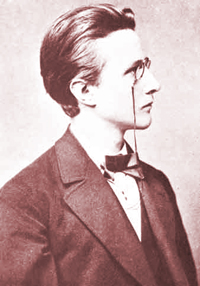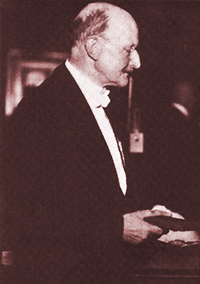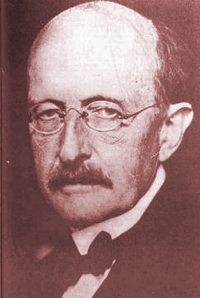
2 MARKS COIN - GERMANY - MAX PLANCK COMMEMORATIVE
(KM 116)
Date: A.D. 1958
Obverse: Portrait head left - MAX PLANCK 1858 - 1947
Reverse: Eagle - BUNDESREPUBLIK DEUTSCHLAND 2 DEUTSCHE MARK (Republic of Germany 2 Marks)
Engraver: Karl Roth
|
Max Karl Ernst Ludwig Planck was a German Nobel prize winning physicist considered the founder of Quantum Theory and one of the most important figures in the field of modern physics. Max Planck was born on April 23, 1858 in Kiel, Germany to a family of intellectuals. His great-grandfather and grandfather were both theology professors in Göttingen and his father was a law professor in Kiel and Munich. In 1867 his family moved to Munich, and Planck enrolled in school where he studied astronomy, mechanics and mathematics. Planck proved an excellent student and graduated when he was only 16 years old. Although Planck was apparently a talented musician who sang, played the piano, organ, cello, and composed songs and operas, he chose to study physics instead. He began his studies in earnest at the University of Munich in 1874. During this time Planck performed experiments studying the diffusion of hydrogen through heated platinum but soon settled into theoretical physics. He received his doctorate of philosophy at Munich in 1879 and held the position of Associate Professor of Theoretical Physics at Kiel until 1889 eventually taking a position as a Professor at Berlin University. Here he remained until his retirement in 1926. He became President of the Kaiser Wilhelm Society for the Promotion of Science, a post he held until 1937. The Prussian Academy of Sciences appointed him a member in 1894 and Permanent Secretary in 1912. Planck's earliest work was on the subject of thermodynamics. He published papers on entropy, on thermoelectricity and on the theory of dilute solutions. He studied the problems of radiation processes showing that these were electromagnetic in nature. These studies led him to the problem of the distribution of energy in the spectrum of full radiation. His experimental observations on the wavelength distribution of the energy emitted by a black body as a function of temperature were at odds with the prevailing views of classical physics. Planck was able to deduce the relationship between the energy and the frequency of radiation. In a paper published in 1900, he announced his derivation of the relationship: this was based on the revolutionary idea that the energy emitted by a resonator could only take on discrete values or quanta stating that the energy for a resonator of frequency is a universal constant, what would eventually be called Planck's constant. The importance of this discovery, with its far-reaching effect on physics, was not appreciated at first. However the evidence for its validity gradually became overwhelming. Planck eventually won the Nobel prize for physics in 1918 "In recognition of the services he rendered to the advancement of Physics by his discovery of energy quanta." Planck's work on the quantum theory, as it came to be known, was published in the Annalen der Physik. His work is summarized in two books Thermodynamics and Theory of heat radiation. In 1887 Planck married Marie Merck. They had four children: Karl, twins Emma and Grete, and Erwin. He enjoyed his personal life with his family and friends often holding gatherings in his home where music would be played along side lively discussion. The Planck home became a social and cultural centre; numerous well-known scientists, such as Albert Einstein, Otto Hahn and Lise Meitner, were frequent visitors. In 1909, after more than 20 years of marriage, Marie Planck died, possibly of tuberculosis. In March 1911 Planck married his second wife, Marga von Hoesslin who bore him his third son, Herrmann. Through his later years Plank suffered his fair share of personal tragedies. During the First World War Planck's oldest son, Karl, was killed in action at Verdun, and Erwin was taken prisoner by the French in 1914. His daughter Grete died in 1917 while giving birth to her first child; her sister lost her life two years later in the same circumstances. Both granddaughters survived and were named after their mothers. Planck lived through two World Wars. Although Planck did not succumb to extreme nationalism, there is no doubt that he supported the German war effort during World War I. He signed the much maligned 'Manifesto of the Ninety Three', a document signed by 93 of Germanys best known scientists and intellectuals that defended Germanys actions and pleaded its case to the international community as well as stating in no uncertain terms their unwavering support for the German war effort. In 1915 Planck revoked parts of the Manifesto, and in 1916 he signed a declaration against German annexationism. Ironically many who signed this manifesto were Jewish and would later be persecuted under the Nazi regime, notably the chemist Fritz Haber, considered the father of chemical warfare, who would be expelled from Germany in 1933 for his Jewish ancestry. In the years leading up to WWII Planck issued the slogan "persevere and continue working". He tirelessly worked to rebuild and fund the German scientific community that was in shambles. He became a member of the 'German Peoples Party' although many criticized his opposition to 'universal suffrage' as elitist. He expressed later the view that the Nazi dictatorship was the result of "the ascent of the rule of the crowds". Planck was 74 when the Nazis took power in Germany. He watched as many of his colleagues fled Germany. In the end Planck saw himself as German for good or ill and he chose to stay instead of flee asking scientists considering leaving the country to do the same in the hopes that the crisis would abate soon and the political situation would improve. He was an opponent of the Nazi regime if not terribly vocal seeing it as futile. In answer to a request for a public proclamation in opposition to the persecution of the Jews he said "If you are able to gather today 30 such gentlemen, then tomorrow 150 others will come and speak against it, because they are eager to take over the positions of the others." Still, Planck tried to discuss the issue with Adolf Hitler but was unsuccessful. When, in 1938, the Prussian Academy was taken over by Nazis, Planck protested by resigning his presidency. Eventually allied bombing campaigns forced Planck and his wife to leave the city temporarily and live in the countryside. In 1942 he wrote: "In me an ardent desire has grown to persevere this crisis and live long enough to be able to witness the turning point, the beginning of a new rise." In 1944 his home in Berlin was completely destroyed by an air raid, annihilating his entire scientific records and correspondence. In January 1945 his son Erwin was executed by the Nazis because of his participation in the failed attempt to assassinate Hitler in July 1944. Planck was very close to his son Erwin and his death came as a crippling blow. He died at Göttingen on October 4, 1947. |



